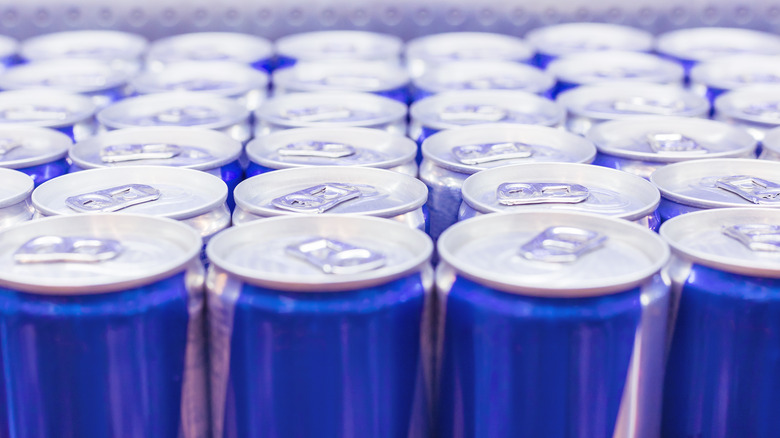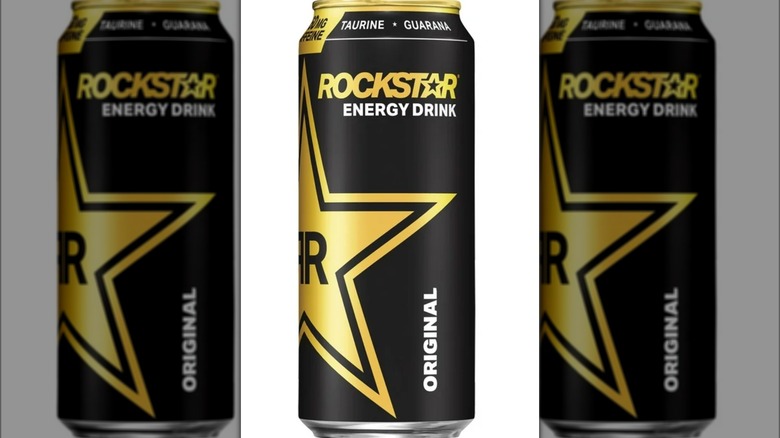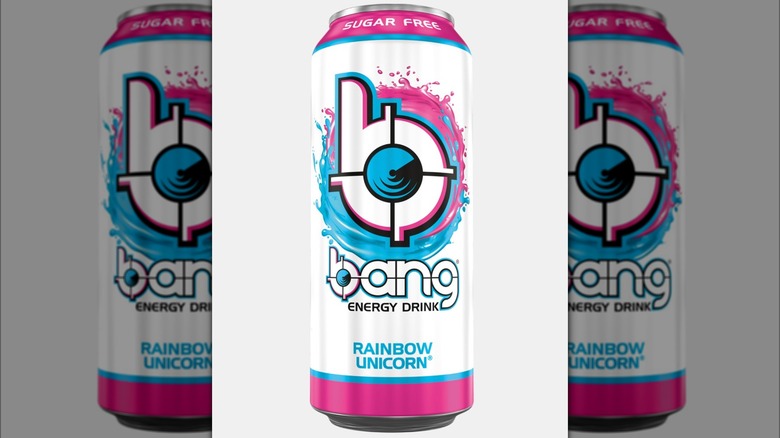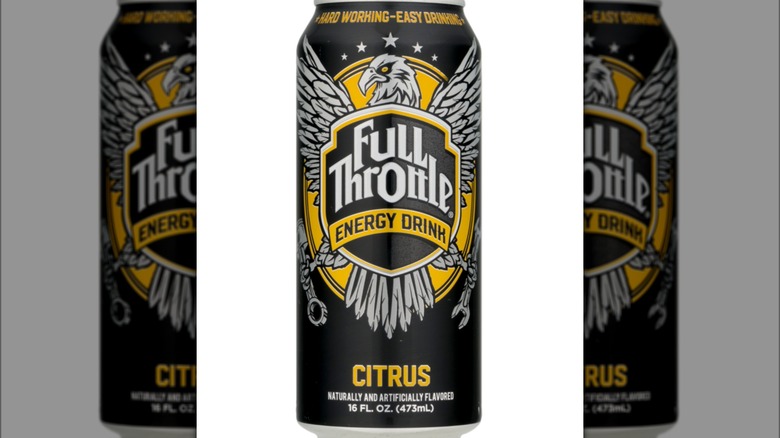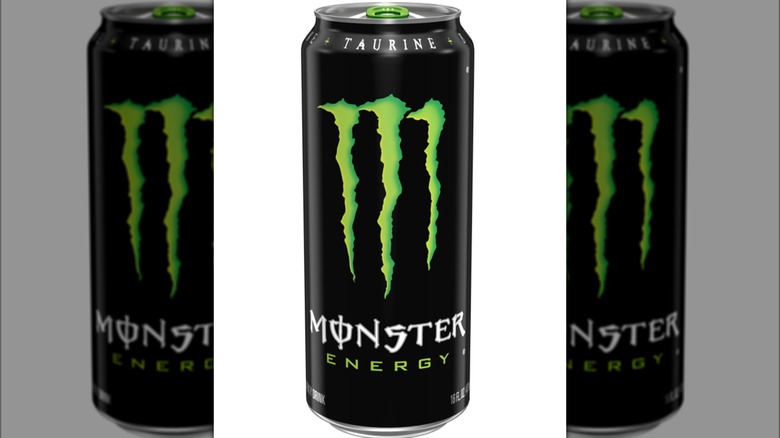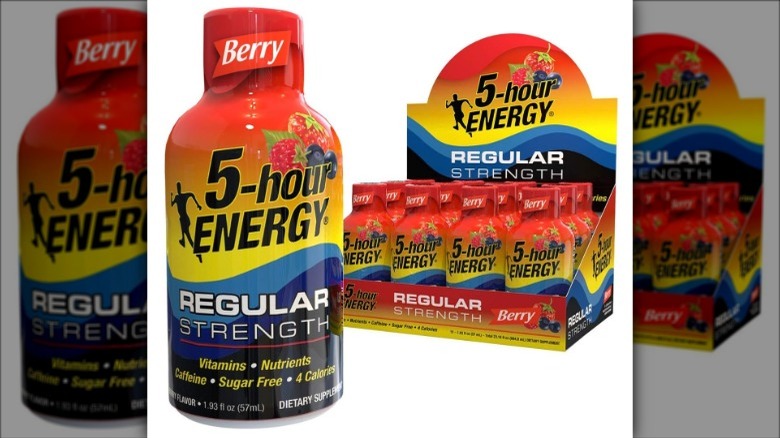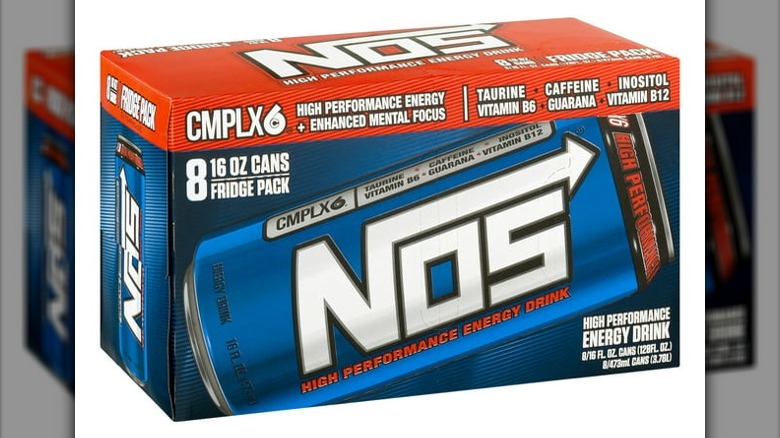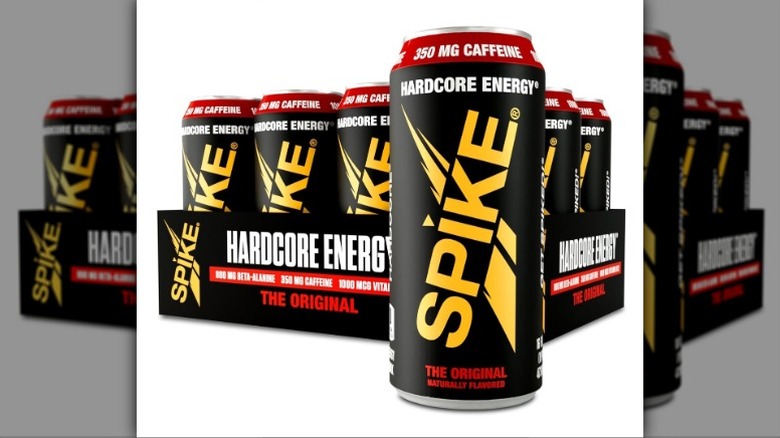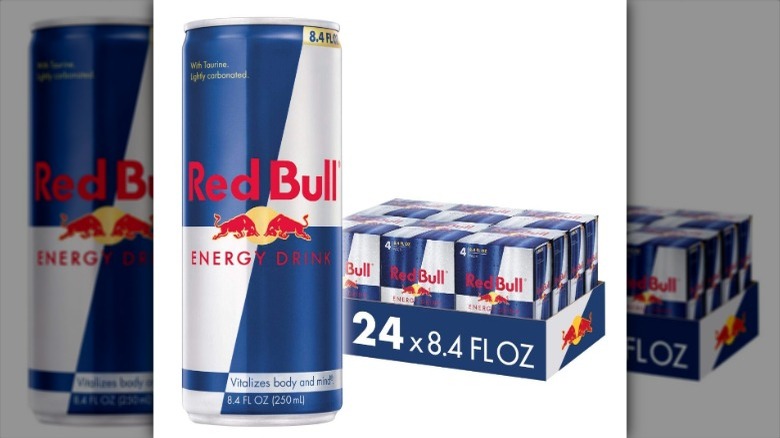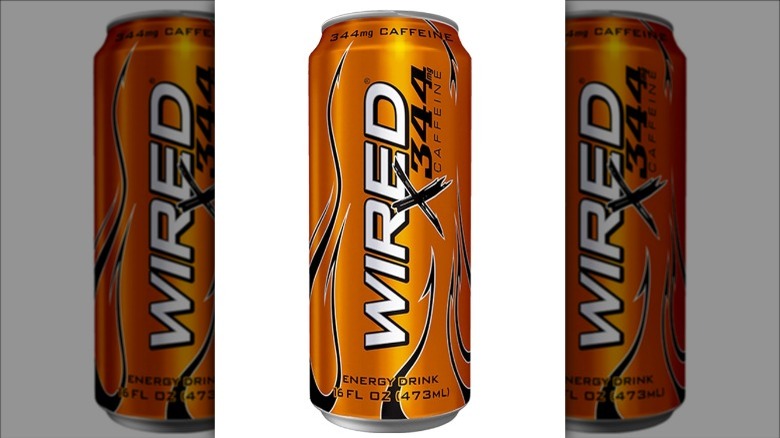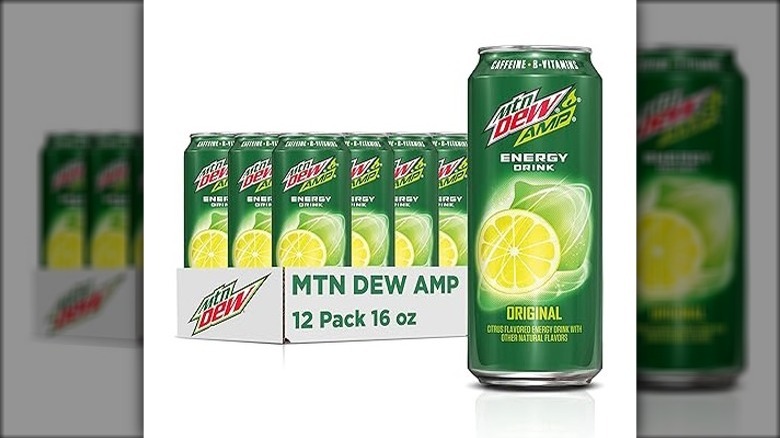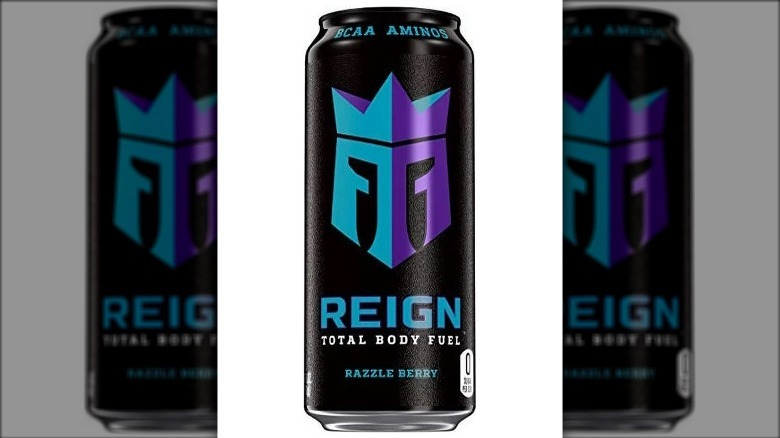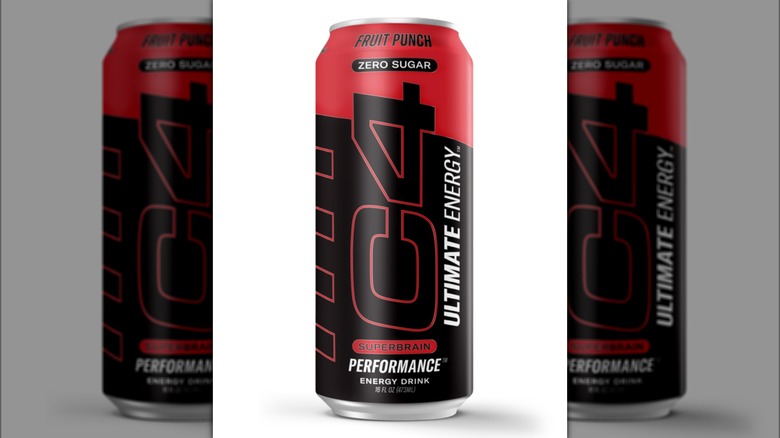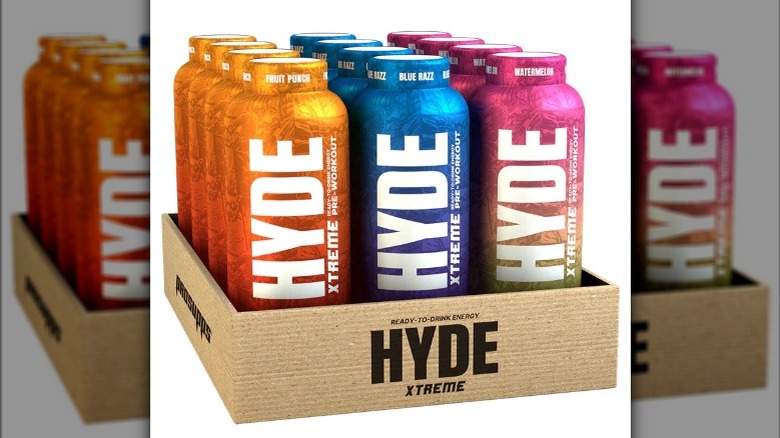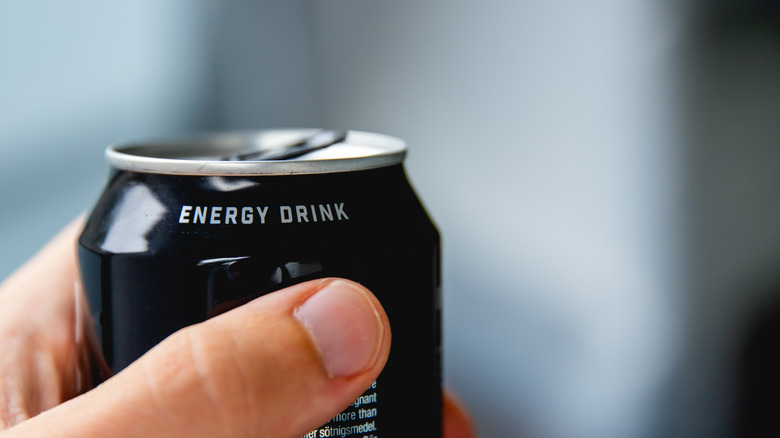13 Of The Unhealthiest Energy Drinks You Should Avoid At All Costs
Designed to give you a quick boost of stimulation, energy drinks have become more popular with each passing year. The energy drinks market was valued at well over $20 billion in 2021 and is set to grow by over 8% annually until 2030, according to a report by Grand View Research. These beverages, however, are nothing if not controversial. Energy drinks have faced a lot of criticism in recent years due to their often excessive caffeine content, which can frequently cause people to exceed the FDA's suggested limit of 400 milligrams per day. They're also been subject to scrutiny due to their sometimes high amounts of sugar, as well as their popularity among young people and children, thanks in part to clever marketing tactics that appeal to youthful mindsets.
Recently, there has been an industry-wide attempt to correct this image, partly as a response to consumers getting wise to the ingredients they're drinking. "They're paying a lot of attention to sugar, artificial flavors, synthetic caffeine. They want energy but they want the best energy," Machu Picchu Energy's CEO Daniel Scharff explains to Just Drinks. Despite this, though, there are still plenty of reasons to think twice about energy drinks – and avoid certain particularly concerning ones. In this article, we focus on energy drinks that still have astoundingly high caffeine levels. We also note when energy drinks contain high amounts of sugar or carry other ingredients that could be deemed unhealthy. You can read more about our methodology at the end of the article, but for now, here are the beverages you really should be avoiding.
1. Rockstar
One of the biggest names in the energy drink market is also one of the most resistant to change. While other energy drink producers have tried to make their products healthier, Rockstar has kept its flagship product sky-high in caffeine and sugar. Each can of Rockstar Original has 160 milligrams of caffeine per 16 ounces, and another flavor in its product line, Rockstar Punched Fruit Punch, has 240 milligrams per can. In one fell swoop, this covers a huge proportion of your daily recommended limit for caffeine.
Its sugar content, too, doesn't hold back, with its Original flavor containing an astonishing 63 grams of added sugar. This totally exceeds the recommended daily value for added sugar and is more than double the 25-gram daily limit recommended by the American Heart Association for women. The overall effect of drinking Rockstar regularly has been specifically noted in a study published by JAMA. In the study, subjects were asked to drink a can of Rockstar and a placebo drink, and it was found that drinking Rockstar increased blood pressure. It was proposed that the long-term effects of this may result a higher risk of cardiovascular disease.
2. Bang
As its name suggests, Bang is an energy drink that seeks to make a big impact. Unfortunately, the way that it does this is with a shocking amount of caffeine. Each can of Bang contains 300 milligrams of caffeine, which it delivers in just 16 ounces of liquid. It should be pointed out that it does so while being sugar-free and containing little sodium, which is more than can be said for some of its competitors, but let's be real — that amount of caffeine is far from normal.
It's worth remembering that caffeine use doesn't just have short-term effects. In the long term, consuming too much caffeine regularly can lead to weaker bones and a higher likelihood of fractures, an increase in stomach acid production, and anxiety, as well as increased blood pressure. While this might only occur if you're consuming more than 600 milligrams a day on a regular basis, drinking two cans of Bang daily will get you to this point. Drinking high amounts of caffeine may also cause issues during pregnancy and while breastfeeding.
3. Full Throttle
Energy drink companies love to give their products names that indicate how powerful they are. Enter Full Throttle, a true testament to this and an energy drink you really should steer clear of. What makes this drink especially worrying is not just its caffeine content but its sugar content as well. Registered dietitian Trista Best warns Eat This, Not That, "The energy drink that gets to the top of my worst list is Full Throttle, which comes in at 220 calories and is packed with sugar. The carbohydrates found in this particular energy drink are all from sugar at 58 grams."
Each can of Full Throttle Original Citrus also has a somewhat troubling 160 milligrams of sodium, which, when combined with its sugar content, adds up for a fairly worrying nutritional profile for a beverage. As for its caffeine levels, there's a hefty 160 milligrams per can, almost half of the daily limit recommended by the FDA. It should be pointed out that Full Throttle states that each 16-ounce can is, in fact, two servings. Let's be honest, though: Who's only drinking half of their can and saving the rest for later?
4. Monster Energy
Arguably the king of all energy drinks, Monster Energy is anything but natural — which is pretty surprising considering its roots. Monster Energy was created by Hansen's Natural, a beverage company started in the 1930s that peddled fresh fruit juice to its Californian customers. Jump forward to the turn of the 21st century, though, and Hansen's was bought out, Monster Energy was invented, and the rest is history.
Nowadays, Monster Energy is a Frankenstein's, well, monster, of a product, with a lengthy list of scientific-sounding ingredients and stuffed full of caffeine, sugar, taurine, and sodium. In each can there are 160 milligrams of caffeine and a staggering 370 milligrams of sodium, about the same amount as some slices of frozen pizza. Its sugar levels, too, give us cause for concern, as every can delivers 54 grams of added sugar.
The sugar in energy drinks like Monster can be a pretty serious issue. Drinking sugar-sweetened beverages has been linked to higher incidences of hypertension, cardiovascular diseases, and mortality, according to a meta-analysis published in Frontiers in Nutrition. Throw the massive amount of caffeine into the mix, and this is a drink you don't want to mess with.
5. 5-Hour Energy
Energy drinks typically come in super-size cans, but some, like 5-Hour Energy, are just as impactful in a small size. Don't get us wrong, though: This impact definitely isn't a good thing. Each serving of 5-Hour Energy comes in a tiny bottle that contains barely 2 fluid ounces. Inside that, though, is a whopping 200 milligrams of caffeine (or 230 in the Extra-Strength version), as well as over 20,000% of your daily value for vitamin B12.
This ultra-concentrated dose means that you can shoot back over two cups of coffee's worth of caffeine in one gulp. This feels to us like a surefire way to at best get your nerves jangling, and at worst, totally misjudge your overall caffeine intake for the day.
More profound symptoms than jangled nerves, ones with potentially life-threatening consequences, can also occur when drinking too much caffeine — and have been specifically associated with 5-Hour Energy. In 2012, the New York Times reviewed a summary of FDA records and found that 5-Hour Energy was cited in 13 individual death reports. In response, the distributor of 5-Hour Energy, Living Essentials, put out a response stating that its product was safe when used per its guidelines, and not in conjunction with alcohol or drunk in excess.
6. NOS Energy
Everything about NOS is pretty garish: Its name, which was derived from its original bottle design, made to look like a nitrous oxide system tank; its bright blue and red packaging; and its ingredients list. This energy drink is not for the faint of heart, and its caffeine content proves it. Each 16-ounce can contains 160 milligrams of caffeine, as well as a parade of other ingredients, including taurine, inositol, and B vitamins. It also has an absolutely massive amount of sugar, packing in 51 grams per can, supplied by high-fructose corn syrup.
In addition to this, NOS also contains guarana, an additive that makes its way into loads of energy drinks. Guarana extract is derived from the guarana seed, a plant native to the Amazon, and as such, it's often perceived to be "natural" or a healthier form of energy supplementation. Its effects, however, are not that good for you. Guarana is full of caffeine, and the way it works can be pretty troubling. "The caffeine in guarana doesn't release as soon as it hits your stomach, like the caffeine in coffee does. It releases more slowly and over a longer period of time," registered dietitian Beth Czerwony tells Cleveland Clinic. This can result in a more intense caffeine high, overconsumption of caffeine, and a range of unwanted side effects like heart palpitations and headaches.
7. Spike Hardcore Energy
Well, we've gotta hand it to Spike Hardcore Energy: Its name is a pretty accurate description of the product. This energy drink is hardcore alright, with its caffeine content one of the highest out there, at a staggering 350 milligrams per can. Not only is this the same amount as in roughly three and a half cups of coffee, but given that the recommended limit for caffeine is 400 milligrams a day, it covers almost the full amount in just 16 ounces.
It's also worth pointing out the vitamin B12 amount in this product. Each can of Spike Hardcore Energy has — wait for it — 41,670% of your daily value for vitamin B12. This vitamin is commonly marketed and sold as a supplement, but it's useful to note that for people who already have good levels of it in their system, it generally doesn't do very much. High doses of vitamin B12 have also been observed to be particularly impactful in some instances, especially on individuals who have kidney damage caused by diabetes, according to a study published by JAMA. Generally, though, the level of vitamin B12 found in Spike Hardcore is just unnecessary — our bodies filter excess B12 out through our urine, so cramming this energy drink full of it is kind of just a marketing gimmick.
8. Red Bull
Given that the distinctive-tasting Red Bull is pretty much everywhere (with no signs of stopping — over 12 billion cans were sold worldwide in 2023, per Statista), including it on this list might be surprising. How bad can such a mass-marketed product be, right? Well, as it turns out, pretty bad.
Original Red Bull is full of caffeine and, ounce-for-ounce, has a comparable amount to competitors like Monster and Rockstar. "One large can of Red Bull contains 108 milligrams of caffeine, and increased intake of caffeine can lead to increased blood pressure and increased heart rate," clinical dietitian Jessica Mason notes to Eat This, Not That. "Long-term use of Red Bull can lead to overall poor heart health."
Where Red Bull somewhat gets away with things — and, admittedly, where it's not as bad as the others — is with the size of its standard can. Coming in an 8.4-ounce serving, it's roughly half the size of a lot of other energy drinks, so if you're only consuming one, this can make it a better choice. Double up on Red Bulls, though, and you'll be getting pretty much the same caffeine and sugar amounts as in those other cans.
9. Wired
Wired lives up to its branding: You'll feel pretty wired after drinking it. This energy drink company has a range of beverages on offer, and some of them are shockingly high in caffeine, with its X-344 flavors containing 344 milligrams in each can. Although it has a sugar-free version of the drink, its regular X-344 beverages contain 50 grams of sugar per serving, which is delivered via high-fructose corn syrup.
Wired drinks, like many other energy drinks, also have a variety of added ingredients that serve to boost their energizing function. One of them, inositol, deserves a little more attention. Inositol is a naturally produced sugar which is also found in certain foods. Supplementation with inositol, however, has been associated with certain side effects. Headache, diarrhea, and dizziness have all been observed when consuming supplementary inositol. It's worth pointing out, too, that these symptoms can also occur when you're drinking too much caffeine, and as such, drinking a caffeinated drink containing inositol could exacerbate issues, or else make identifying the cause of them challenging.
10. Amp Energy
Most energy drinks exist separately from already established carbonated beverages, but some manufacturers have seen the potential for an energizing version of your favorite drink. We would imagine this was how Amp Energy came about, which is essentially a more citrusy version of Mountain Dew's hard-to-describe flavor with even more caffeine. If you were expecting this version of the iconic drink to be healthier, well, we've got some bad news for you. Its combination of a high amount of caffeine (142 milligrams) and an ultra-high amount of sugar (58 grams) per can means that you should keep it off the menu.
It's also crucial to point out exactly where that sugar content comes from. In Amp Energy, the sugar source is high-fructose corn syrup. Differing from regular corn syrup due to its fructose content, high-fructose corn syrup places a larger amount of stress on our liver, which has to convert the fructose to glucose, glycogen, or fat. This can have an impact on your insulin sensitivity. It's worth considering whether you can get your caffeine fix in a manner that doesn't require you to drink so much of a potentially unhealthy ingredient, instead of by drinking Amp Energy.
11. Reign
Reign is a drink made and marketed with exercise in mind, from its description of itself as "fuel," to its prominent inclusion of BCAAs and amino acids, and to its marketing material showcasing athletes chugging from its cans. Don't let this seemingly health-focused slant fool you, though. Reign's caffeine levels make it anything but nutritious, sporting 300 milligrams per can. Although it's quick to point out that its caffeine is natural, this doesn't make too much of a difference when it's as removed from its natural source as it is here. Natural caffeine has the same impact on the body as synthetic caffeine does, and in these quantities, it'll cause serious jitters.
It'll mess with your sleep, too. Caffeine has long been associated with insomnia, and it's important to remember that lack of sleep will do more than just make you cranky. Regular sleep deficiency can have a profound effect on your health, leading both to a higher risk of accidents and injuries as well as a greater chance of developing chronic health problems like kidney disease, stroke, heart disease, and high blood pressure. In the quantities that it comes in here, let's just say Reign's a drink you should never have after dinner. Its caffeine content could end up affecting your sleep significantly, not to mention contributing to wider health issues.
12. C4
C4 is presumably named after the explosive substance, and it seeks to have the same immediate impact on your energy levels. Unfortunately, the way that it goes about this isn't ideal. While there might be some foods and drinks you didn't know have caffeine, that won't be the case with C4 — with 300 milligrams in each 16-ounce can, providing roughly the same amount as is in 12 cups of tea, you'll definitely be feeling this drink.
Don't let its sugar-free status fool you, either. C4 may come in a range of sugar-free flavors, which allows you to sidestep the dozens of grams of sugar that are in comparable energy drinks, but it gets its sweetness from the inclusion of sucralose. This artificial sweetener has long had question marks over its effect on the body, and one of the more worrying impacts it has is on insulin levels. A study published in Nutrition Journal examined the impact that sucralose intake has on non-insulin-resistant adults and found that consuming it long-term can reduce insulin sensitivity and cause an overproduction of insulin in response. This can be a risk factor for type 2 diabetes.
13. Hyde Xtreme
Hyde Xtreme is in a world of its own when it comes to energy drinks — and that's not a good thing. This super-charged beverage has a frightening amount of caffeine per serving, containing 400 milligrams in each bottle. This is the maximum amount recommended by the FDA to be consumed per day and is the equivalent of over four cups of coffee's worth of caffeine in one go. It's so intensely caffeinated that manufacturer ProSupps even recommends that if you haven't drunk it before, you should try half first and see how it affects your body. If people don't see that warning, though, they can be in for a pretty intense experience. (In other words, it's important to always check your energy drink's label.)
It's worth pointing out that Hyde Xtreme is marketed as a "pre-workout," with a host of other energizing ingredients like l-citrulline, beta-alanine, and yohimbe, an herbal supplement that is often used to treat erectile dysfunction. While its caffeine may help you train longer, the quantity here is just worrying. Drinking more than 400 milligrams daily (which is easily done if you combine this drink with literally anything else that contains caffeine) can impact your cardiovascular system, causing an increase in heart rate, chest pain, and high blood pressure.
Methodology
When selecting energy drinks for this article, we focused first and foremost on their caffeine content. We opted to include examples that felt excessive, particularly when compared to other caffeine-containing drinks like tea or coffee or the FDA's recommended limit of 400 milligrams per day.
Caffeine may seem like a simple stimulant, but keeping track of your intake is incredibly important. Not only can it have a significant impact on health when drunk in higher quantities, but overconsumption of caffeine can lead to dependence. Caffeine Use Disorder has been associated with energy drinks in scientific studies, according to a review written up in the Journal of Caffeine Research, and worries remain about the link between these drinks and other potentially risky behaviors, as well as their effects on health and mortality.
We also looked at energy drinks that contained additional unwanted ingredients and focused more specifically on those that have an excessive amount of added sugar. This sugar content, when consumed regularly, is very concerning. Added sugar from energy drinks can have a big impact on intestinal bacteria, which may contribute to the development of metabolic syndrome, and they have been specifically highlighted as increasing the risk of diabetes in children.
